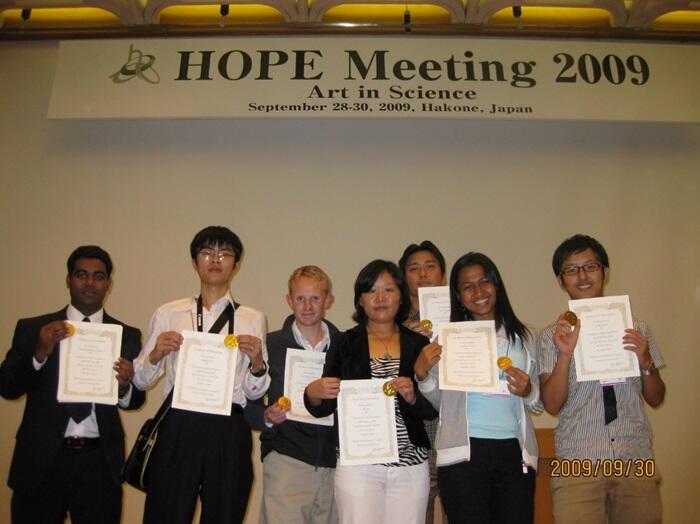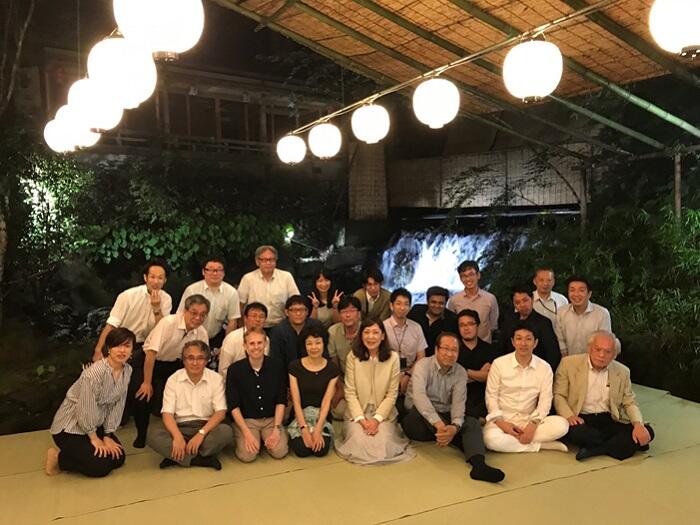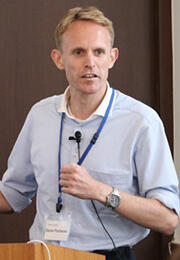-

- Daniel Packwood
- Associate Professor, Institute for Integrated Cell-Material Sciences (iCeMS), Kyoto University
When I first mentioned that I would be moving to Japan for a postdoc, the comments of my professors in New Zealand ranged from incredulous to condescending: "Don't go there"; "Were there no other postdoc positions available?"; "Don't waste your career on some silly cultural experience"; "I'll call my friend at Oxford and see if he can find you a job." I was a good student, and good students usually headed to the UK for their postdocs. Yet being a good student, I knew that suitable opportunities awaited in Asia as well. Thus, in late October 2010 I departed New Zealand as a freshly minted PhD and made my way to Kyoto, Japan.
Actually, I hardly thought about Japan until I was well into my graduate studies. I was working in the area of chemical physics, applying statistical mechanics to model atom scattering from liquid surfaces. Two names would appear frequently during my research: Ryogo Kubo and Kiyoshi Ito. Both were prominent Japanese scientists during the 20th century. Kubo was a professor from the University of Tokyo and a statistical mechanics pioneer; Ito was a professor from Kyoto University who created the field of stochastic calculus. After spending much time studying their works, I came to associate Japan with my research interests. Then, towards the end of my graduate studies, I had the fortune of being invited to attend the 2nd HOPE Meeting in Kanagawa in 2009. It was my first trip to Japan, and I had a thoroughly good time - the quality of the science was high, the students were doing excellent work, and the event itself was immaculately organized. In the end the decision was easy - do my postdoc in Japan.

Charting a course in Japan
My initial appointment was as a JSPS Foreign Postdoctoral Fellow. I worked under host Prof. Yoshitaka Tanimura, a brilliant theoretical physicist at Kyoto University. Tanimura was actually Kubo's final graduate student, and he and his group had developed many interesting techniques for simulating so-called 'open' quantum systems. These techniques expanded much of Kubo's early work, making it applicable to topical problems such as energy transport during photosynthesis and charge transport in DNA. I learned a huge amount of new theory while I was there, much of which would become useful in later years. I ended the fellowship early in 2012 after being offered an assistant professorship at Tohoku University.
At Tohoku University I worked at the Advanced Institute for Materials Research (AIMR) and was assigned to the Mathematical Sciences Unit. The Mathematical Sciences Unit had been formed in haste. In the months prior to my appointment, AIMR had received a punishing mid-term evaluation from its major funder (the WPI program) and had to take immediate action to do something innovative. Their solution was to hire a group of young mathematicians and integrate them into the on-going materials science research. It was an exciting position, allowing me to sharpen my theoretical skills while expanding the scope of my research by collaborating with materials scientists. With them, I researched topics ranging from diffusion inside of nanoporous metals to graphene nanoribbon assembly. The strategic nature of this position also gave me some valuable insights into the workings of Japanese science. AIMR's idea of integrating mathematics into materials science was met with some skepticism at the time. However, as an institute-level strategy it worked out well, and AIMR remains strong in both materials science and mathematics to this day. I stayed for four years, leaving in 2016 after being offered a position at Kyoto University.
I joined iCeMS (Institute for Integrated Cell-Material Sciences) at Kyoto University as a senior lecturer and principal investigator. I was promoted to associate professor last year. I'm currently leading a small research group containing four postdocs, two students, and a secretary. Using theoretical methods from chemistry, physics, math, and data science, we study novel functional materials for energy and biomedical applications. We are particularly interested in bio-active single molecules and molecular assemblies, porous molecular materials, and semiconducting molecular crystals. We figure out how these materials can be designed atom-by-atom in order to achieve targeted properties and functions, developing a host of new theoretical methods to make progress. We work closely with several experimental research groups and aim for tangible outcomes by collaborating with them.

Tips for young scientists
The following are things that I have learned over the last fourteen years since graduation. The reader can decide for themselves whether I am qualified to dispense career advice!
Tip i. Don't fret over your status as a foreigner
While these tips are meant for everybody, there might be some expectation that I speak from the special perspective of a foreign scientist. The following opinion might disappoint, but being a foreigner in Japan is no different than being Japanese in Japan. The ebb and flow of academic life is universal. You come to the lab, do experiments, discuss your results, write grant proposals, and write papers. Your Japanese colleagues do the same. Like them, you will experience the ups and downs of paper and grant acceptances and rejections. If you view your career as a slow process of growth through trial, then you will discover that you are in the same boat as everyone else; if your view is limited to the immediate and temporary, then you will become an emotional ping-pong ball prone to attributing your failures, if not your successes, to your minority status. How you choose to set your viewpoint is entirely up to you. How other people choose to react to your viewpoint will be up to them.
Tip ii. Learn how to add value to a team
It is strange how old notions of academia persist. How many students enter graduate school with the view of an academic as a whimsical figure cloistered in a dark office contemplating the zeroes of the zeta function? I certainly did. If I did anything right in my career, it was that I was quick to abandon this thinking early after graduation.
As with any other profession, you cannot succeed in academia by simply doing whatever you want. For better or worse, academia is dependent on research funds. Professors spend most of their time writing grant proposals, and that involves assembling a team of scientists with complementary skills and showing how they can solve some problem of relevance by working together. Most postdocs and many early career faculty are employed on these grants. These people will therefore be evaluated by the degree to which they fulfil the roles assigned to them in the original proposal. That does not mean that they have no creative freedom. Indeed, grant proposals will rarely describe the detailed work of each team member. However, if computing the zeros of the zeta function is your thing, then you might want to put it away until you can find a genuine use for it in the grand scheme of the project. Otherwise, you might find that it is you who ends up being the zero!
Perhaps I am being a little blunt. The key point is that when working as part of a funded project, it is important to determine what others expect from you and how you and your expertise can integrate into other people's work. Such team-type environments can be quite stressful for younger scientists, as they are expected to collaborate with others while also building their own scientific identity. However, these two aims are not mutually exclusive. A good project will provide something of an economy of ideas, where each participant can develop their own unique specialty through a series of intellectual exchanges with the other participants.
Tip iii. Learn to communicate properly
Communication skills − both written and verbal - are unbelievably important for a scientist. All projects begin and end with an act of communication, be it in the form of a proposal, an interview, a presentation, or a paper. Why our graduate programs put so little emphasis on writing and speaking is a mystery beyond all comprehension.
One way to improve your written communication skill is to read as much as possible. Reading scientific papers is obviously part of the job and will at least expose you to good and bad writing. However, do not limit your reading to scientific papers alone. Immerse yourself in works of non-scientific fiction and non-fiction as well. Look carefully at the choice of words the authors use, how they structure their arguments, and how they arrive at their points. Observe too how these authors use imagery to convey their messages. I spend much time reading popular works on political economy and history. My favorite authors include the renegade Labour politician John A. Lee, the flamboyant economist John Maynard Keynes, his rival Friedrich Hayek, and the straight-talking economist Milton Friedman. Their works have no direct connection with my research, yet their style of communication leaves me in awe. As a scientist you will never be expected to write at the level of these authors. Indeed, it would be wholly inappropriate to do so; scientific papers are formal rather than rhetorical in nature. However, if you can marshal your words in the way that the greats can, then you will be writing above and beyond the level of the average scientist.
Reading will also help you to become a better speaker. You will learn to think in terms of words and will have words ready on your tongue when you present your work and address questions. Your presentations will structure themselves, because you will develop an intuitive sense for how effective arguments unfold and how to move between points. To think in terms of words − as opposed to curves and abstractions − is what one should aim for when writing or preparing a presentation. For great communicators, reading and speaking are two sides of the same coin. Nourish one and the other will flourish.
Tip iv. Be confident
I am forever telling my group members to be confident, although until now I have not really thought about what this means.
A confident scientist thoroughly understands the principles behind their work and can use them to explain where their results came from. If there happen to be some aspects that they do not understand, then they are prepared to state these aspects up front. Having placed all knowns and unknowns on the table, a confident scientist can then disassociate their sense of self from their work and let their work stand on its own for judgment. With the connection between self and science severed, a confident scientist can accept criticism of their work. They can later reflect upon such criticism and make a sound judgment about how to move forward without ruminating on questions of self-worth.
As described above, genuine confidence is impossible to achieve. Young scientists fresh out of graduate school are used to being judged and ranked by their professors, which naturally inclines them to view research as some kind of never-ending university examination. Moreover, scientific research is actuated by curiosity and passion, which naturally creates a strong bond between self and science. Rather than trying to attain an impossible ideal, perhaps it is better to aim to be the next best thing: somebody who can disconnect and reconnect self and science at will.
Confidence is important because it is a pre-requisite of good leadership. As such, people will expect you to show confidence as you move up the academic ladder. Confidence will also make you a better collaborator, as you will be both less defensive and less arrogant. Perhaps most importantly, confidence will save you from becoming an academic bully, a sad little specimen who inspires nothing but resentment.
Tip v. Be nice to everybody
I received this tip from the senior mathematician Prof. Yasumasa Nishiura when I started working at Tohoku University. I only came to appreciate its importance several years later. Of course, being friendly towards people you have only just met is simply part of being a decent person. However, academia is very small, and moreover things unfold slowly and unpredictably over time. Tomorrow, you may just cross paths with that person you met several years ago. Your research interests have probably changed considerably over those several years, and you may now really need their help with your research. Your own values as a scientist have probably changed as well, meaning that this person might now appear very impressive even if they did not leave a strong impression at first. They might even be reviewing your paper or your grant proposal. In any case, you would certainly want this person to have good feelings towards you.
This advice is not easy to follow. Not everybody you meet will reciprocate your niceness, and a few people will be downright awful to deal with. Yet this advice remains extremely effective. Practice it over several years and you will find yourself with the most potent of resources - a large network of friends and supporters who you can call upon at any time.
Good luck to you!

Profile
Daniel Packwood
Associate Professor, Institute for Integrated Cell-Material Sciences (iCeMS), Kyoto University
After completing a PhD at the University of Canterbury (focusing on chemical physics), he worked as a postdoctoral researcher at Kyoto University. Following a stint as an assistant professor at Tohoku University's Advanced Institute for Materials Research, he returned to Kyoto University, where he joined iCeMS as a senior lecturer and principal investigator in 2016. Has been in his current position since 2023.
Received the 5th Hiroshi Fujiwara Encouragement Prize for Mathematical Sciences in 2016 and was a JST PRESTO researcher between 2014 and 2018. Since 2024 he has been a JST FOREST researcher.



